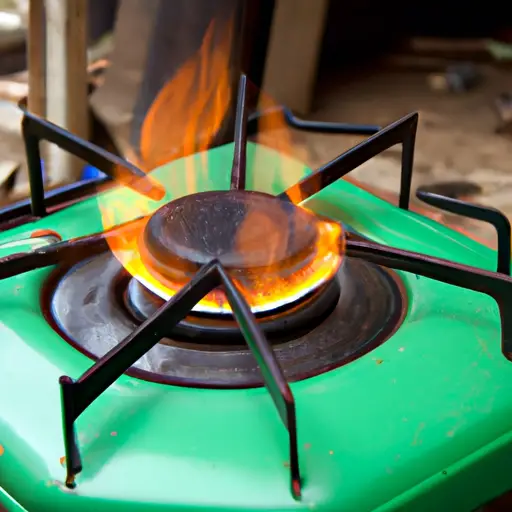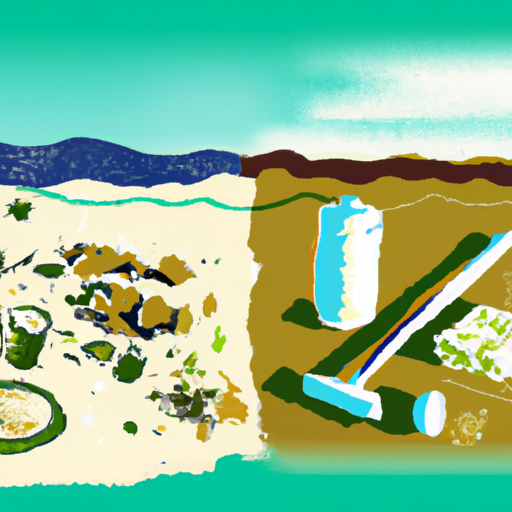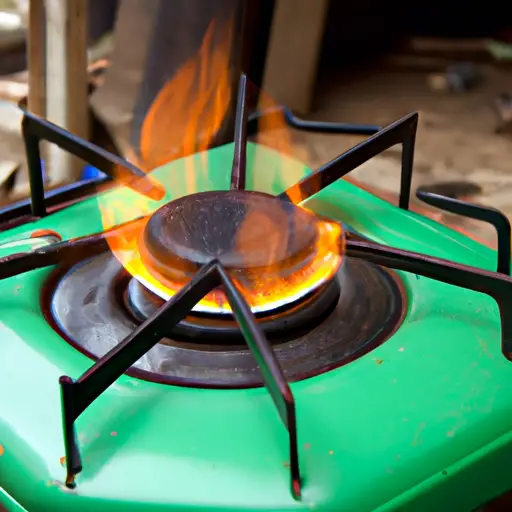So, have you ever thought about what it would be like to live off the grid? You know, no electricity, no modern conveniences, just living the simple life? Well, if you have, I’m sure you’ve wondered about some basic things like, how do you even boil water without electricity? I mean, it’s something we take for granted, but when you’re living off the grid, it can be a bit more challenging.
But fear not, because I’m here to clue you in on how to boil water in an off-grid lifestyle. There are actually quite a few methods you can use, depending on your resources and preferences. From using a wood-burning stove or fire pit to utilizing a solar cooker or a propane stove, there are plenty of options to choose from. In our upcoming article, we’ll guide you through each method and give you some tips and tricks for success.
So whether you’re planning on going off the grid yourself or you’re just curious about how things work without electricity, stay tuned for our article where we’ll dive deep into the world of boiling water on an off-grid lifestyle. Trust me, you’ll learn some valuable knowledge that might just come in handy one day, even if you never plan on leaving the comfort of modern living.

Off-Grid Living
Living off-grid has gained popularity in recent years as people seek to disconnect from traditional utilities and embrace a more self-sufficient lifestyle. It involves relying on alternative methods for essentials like power and water. One common question that arises when considering off-grid living is, “How do you boil water without electricity?” In this article, we will explore various methods to boil water on an off-grid lifestyle.
Understanding Off-Grid Lifestyle
Before we dive into different boiling techniques, let’s take a moment to understand what an off-grid lifestyle entails. Living off-grid means that you are not connected to the main electricity grid, water supply, or other public utilities. Instead, you generate your own power through renewable energy sources like solar panels or wind turbines. Water is often collected through rainwater harvesting or extracted from wells. This self-sufficiency allows individuals and families to reduce their reliance on traditional infrastructure and embrace a more sustainable way of living.
Advantages of Off-Grid Living
There are several advantages to off-grid living. Firstly, it provides individuals with greater control over their energy consumption and costs. By generating your own power, you can reduce or even eliminate monthly utility bills. Secondly, living off-grid encourages a closer connection with nature. It allows individuals to appreciate and utilize renewable resources while minimizing their environmental impact. Lastly, off-grid living fosters self-reliance and resilience. By learning alternative methods for essential tasks like boiling water, individuals become more adaptable to challenging situations.
Challenges of Off-Grid Living
Living off-grid also presents its fair share of challenges. The initial cost of setting up an off-grid system can be significant. Solar panels or wind turbines, for example, require an upfront investment. Additionally, off-grid living requires careful planning and maintenance. You must ensure that your energy and water systems are efficient and reliable. Finally, adjusting to a self-sufficient lifestyle may require a significant change in habits and routines. Conserving resources and using them efficiently becomes a crucial aspect of daily life.
Traditional Methods of Boiling Water
Now that we have a better understanding of off-grid living, let’s explore various traditional methods of boiling water without electricity.
Fire-Based Methods
Creating fire is one of the oldest and most primitive methods of boiling water. To do so, you can build a fire pit in your backyard or use a portable camping fire pit. Gather firewood or biomass such as twigs, leaves, and pine cones to fuel the fire. Once the fire is burning steadily, you can place a pot or kettle over the flames to boil the water. This method is simple and effective, but it requires constant monitoring and attention.
Solar Methods
Harnessing the power of the sun is another efficient way to boil water off-grid. Solar water heaters utilize the sun’s heat to warm water, which can then be further heated to boiling temperatures on a stovetop or with additional solar concentrators. DIY solar concentrators can be made using reflective materials to focus sunlight onto a pot or kettle. Another option is using solar cookers, which use mirrors or reflective surfaces to concentrate sunlight and create enough heat for boiling water. Solar methods are a sustainable and cost-effective way to harness renewable energy.
Propane Stove Methods
For those who prefer a more convenient and portable option, propane stoves are a reliable choice. Propane stoves can be used indoors or outdoors and offer precise temperature control. When choosing a propane stove, look for one that is compatible with your off-grid setup and has safety features such as built-in regulators and automatic shut-off valves. It is crucial to handle and store propane tanks safely to minimize any potential risks. With a propane stove, boiling water becomes as easy as turning a knob.
Fire-Based Methods
Creating a Fire Pit
To create a fire pit, select a suitable location in an open area away from any flammable objects. Dig a shallow pit about a foot deep and line it with rocks or bricks to contain the fire. Use smaller pieces of firewood to start the fire and gradually add larger pieces as needed. Remember to never leave a fire unattended and ensure it is fully extinguished before leaving the area.
Using Firewood or Biomass
Firewood or biomass serves as the fuel source for fire-based boiling methods. Collect dry twigs, branches, leaves, pine cones, or any other suitable biomass material in your surroundings. Choose materials that are free from moisture to ensure a clean and efficient burn. Stack the biomass in a teepee or log cabin style, allowing enough airflow to promote combustion.
Cooking with a Dutch Oven
A Dutch oven is a versatile cooking pot made of cast iron or ceramic. It can be used directly on open flames, making it a perfect tool for fire-based boiling. Simply place the Dutch oven on the fire, add water, and bring it to a boil. The thick walls and lid of the Dutch oven retain heat effectively, ensuring even cooking and faster boiling times.

Solar Methods
Solar Water Heaters
Solar water heaters use panels or tubes to absorb sunlight and heat water. These systems often include a storage tank to hold the heated water for later use. The heated water can then be further boiled using conventional methods. Solar water heaters are a sustainable and energy-efficient way to preheat water before boiling, reducing the time and energy required for boiling.
DIY Solar Concentrators
If you prefer a more hands-on approach, you can create your own solar concentrator to harness the sun’s energy. Reflective materials such as aluminum foil or mirrors can be used to focus sunlight onto a pot or kettle. By capturing and concentrating solar energy, these DIY solar concentrators can significantly increase the temperature of the water, expediting the boiling process.
Solar Cookers
Solar cookers are specially designed to utilize solar energy for cooking and boiling water. These devices typically consist of reflective panels or surfaces that concentrate sunlight onto a cooking vessel. By trapping and redirecting the heat, solar cookers can effectively reach boiling temperatures. Solar cookers vary in design, with options ranging from parabolic cookers to box cookers, allowing for diverse cooking and boiling methods.
Propane Stove Methods
Choosing a Propane Stove
When selecting a propane stove for off-grid boiling, consider both your cooking needs and safety requirements. Look for a stove that has multiple burners, variable heat control, and a sturdy build. It should also be compatible with your off-grid setup, such as having the appropriate connectors for your propane tank. Additionally, check for safety features like built-in regulators, automatic shut-off valves, and overheating protection.
Propane Tank Safety Measures
Propane can be dangerous if mishandled or stored improperly. When using a propane tank for boiling, ensure that it is securely attached to the stove according to the manufacturer’s instructions. Inspect the tank for any signs of damage or leaks before use. It is crucial to store propane tanks in a well-ventilated area away from sources of ignition. Regularly check the tank’s expiry date and have it inspected or replaced as necessary.
Efficient Propane Stove Cooking
To maximize the efficiency of propane stove cooking, use pots and kettles with lids that fit tightly. This helps trap the heat and boil water more quickly. Additionally, match the pot size to the burner size to minimize heat loss. You can also conserve energy by turning off the stove a few minutes before the water reaches the boiling point, as residual heat will continue to raise the temperature.
Portable Water Boiling Solutions
When you’re on the go or camping off-grid, portable water boiling solutions come in handy. These options are lightweight and designed for outdoor use.
Camping Stoves and Backpacking Cookware
Camping stoves are compact and portable, making them perfect for outdoor adventures. They are typically fueled by propane or butane and offer convenience and ease of use. Combined with backpacking cookware, camping stoves allow you to quickly boil water for drinking or cooking purposes while enjoying the great outdoors.
Rocket Stoves
Rocket stoves are highly efficient and utilize a small amount of fuel to achieve high temperatures. The design of a rocket stove ensures a clean and efficient burn, making it an ideal choice for those seeking a sustainable off-grid boiling solution. Rocket stoves can be homemade or purchased commercially, and their portability makes them a popular choice for camping or emergency preparedness.
Kelly Kettles
Kelly kettles are a unique and efficient way to boil water off-grid. They feature a double-walled construction with a hollow core where fire or fuel can be burned. The kettle’s design allows for rapid heat transfer and efficient boiling. The fuel can be twigs, dry grass, or any other burnable biomass. This makes kelly kettles a versatile and eco-friendly option for boiling water on an off-grid lifestyle.
Water Purification Techniques
Boiling water not only makes it safe to drink but also purifies it by killing most bacteria, viruses, and parasites. While boiling is an effective water purification method, there are various other techniques available.
Boiling as a Water Purification Method
Boiling is one of the most reliable and effective methods for purifying water. By bringing the water to a rolling boil for at least one minute, the majority of harmful microorganisms are killed, making the water safe for consumption. If you are at an elevation above 6,562 feet (2,000 meters), a longer boiling time of three minutes is recommended.
Water Filtration Options
Water filtration is another popular method of purifying water off-grid. Filtration systems effectively remove particulates, bacteria, and protozoa from water. There are several types of water filters available, including activated carbon filters, ceramic filters, and hollow fiber membrane filters. Each filter has its own specifications and filtration capabilities, so it’s important to choose one that suits your water source and quality.
Chemical Water Treatment
Chemical water treatment involves the use of disinfectants such as chlorine or iodine to kill microorganisms in water. These chemicals are added in specific quantities to the water and allowed to react for a certain period before consumption. It is essential to follow the instructions provided with the chemical treatment product, as improper usage can be harmful. Chemical treatments are effective in most water sources but may not be suitable for long-term use due to taste and other considerations.
Off-Grid Water Storage
Off-grid living often requires careful management of water resources. Adequate water storage allows for self-sufficiency during dry spells and interruptions in the water supply.
Rainwater Harvesting Systems
Rainwater harvesting is a common practice in off-grid living. It involves collecting and storing rainwater runoff from rooftops or other surfaces. Rainwater can be collected in large storage tanks or barrels and then filtered and treated for various uses, including boiling, cooking, and cleaning. Rainwater harvesting systems are environmentally friendly and can alleviate the need for additional water sources.
Well Installation and Maintenance
For those living in rural areas, installing a well can provide a consistent and reliable source of water. Wells can be dug or drilled, depending on local geological conditions. However, well installation and maintenance can be complex and require professional assistance. Regular testing and maintenance of the well system are necessary to keep the water safe and free from contaminants.
Water Supply Management
Managing your water supply effectively is vital for off-grid living. This includes monitoring water usage, avoiding wastage, and practicing water conservation techniques. Simple measures like repairing leaks, using low-flow fixtures, and adopting water-saving habits can significantly reduce your water consumption. By being mindful of your water usage, you can maximize the efficiency of your off-grid system and ensure long-term sustainability.
Maintaining a Sustainable Lifestyle
Off-grid living goes hand in hand with maintaining a sustainable lifestyle. By adopting certain practices and utilizing alternative resources, individuals can further enhance their self-sufficiency and reduce their environmental impact.
Conserving Water Usage
Conserving water is fundamental to off-grid living. Every drop counts, so it’s important to be mindful of your water consumption. Implement water-saving strategies such as taking shorter showers, collecting and reusing greywater, and watering plants during cooler hours to minimize evaporation. Conserving water not only reduces your reliance on external sources but also lowers the energy required for pumping and treating water.
Alternative Energy Sources
Aside from boiling water, off-grid living requires alternative energy sources for power generation. Solar panels and wind turbines are popular choices for harnessing renewable energy. By investing in these systems, you can generate your own electricity and reduce your reliance on fossil fuels. Additionally, consider other energy-saving measures such as LED lighting, energy-efficient appliances, and smart home automation to further optimize your energy usage.
Efficient Waste Management
Proper waste management is crucial in off-grid living to maintain a clean and healthy environment. Implement recycling and composting systems to reduce waste sent to landfills. Composting organic waste not only diverts it from landfills but also creates valuable fertilizers for your gardens. Additionally, practicing minimalism and conscious consumerism can help reduce waste generation and overall environmental impact.
Conclusion
Embracing an off-grid lifestyle offers many benefits, including reduced reliance on traditional utilities, a closer connection with nature, and increased self-reliance. Boiling water without electricity is an essential skill for off-grid living, and there are various methods to achieve this. Whether you choose fire-based methods, solar methods, or propane stoves, each offers its own advantages depending on your specific needs and preferences. By exploring different boiling techniques and increasing your self-sufficiency, you can fully embrace the off-grid lifestyle and enhance your sustainable living journey.




